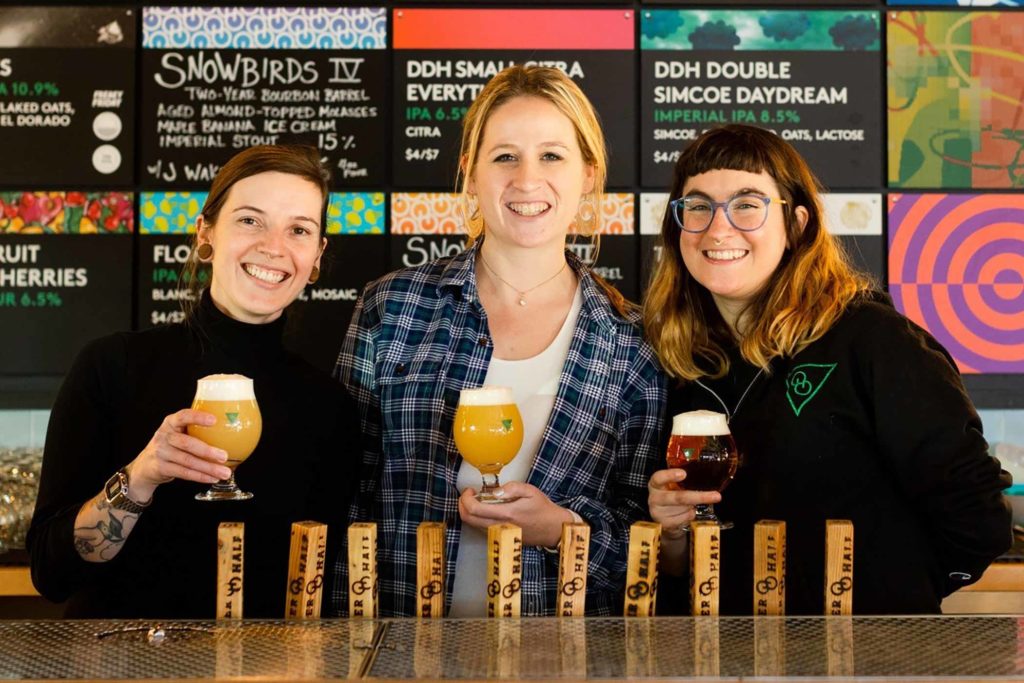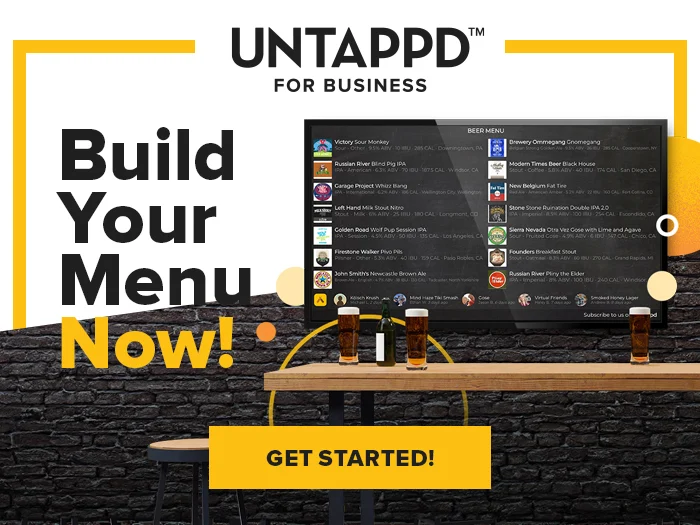
Opening a brewery can be one of the hardest yet most fulfilling challenges. Starting a business requires moving many pieces and making many decisions. A small sample might include: writing a business plan, designing the perfect brewery logo, finding great beer names, pricing your beer properly, learning how to run a successful Instagram, and so much more.
Honestly, the list goes on and on.
But once you’ve established your business, one of the core components will be building a great team around you. Hiring competent staff that understands your mission, policies, and procedures will directly contribute to the success of your company culture and your company as a whole.
Your employees reflect you and your business, so you want to make sure that you hire the right person for the job.
But how?
It all starts with asking the right questions.

Photography courtesy of Fullsteam Brewery
The 11 Best Brewery Interview Questions to Ask
Like with any hospitality job—be it in food service or in the taproom—turnover can be common. To ensure you have the best opportunity for operations to run smoothly, investing in the right people will be crucial. You want to find folks who are the right fit for your establishment. Ones who are excited to be at work, who understand your culture, and who look forward to coming to work every day (or at least most days).
While the interviewing process can be exhaustive, asking the right questions can help you find the right person for your team. This certainly isn’t an exhaustive list. Everyone has their opinion on the best questions to ask, but these top eleven will at least give you a foundation. From here, build out your list to suit your own brewery’s goals and vision.
Pick the ones relevant to you from the list below to help guide you through a more genuine and conscientious interview.
For a brewery owner, crafting the right interview questionnaire and strategy will give you the best chance at finding the right candidate to join your team.
What We’ll Cover in This Piece:
Tell me about yourself
Why do you want to work in the beer industry?
What stood out to you about our brewery?
What is your favorite beer on our tap list?
Where do you see yourself three to five years from now?
What does hospitality mean to you?
Tell me about one time you failed. How did you learn from that failure?
Tell me about one time you had to resolve a conflict. What did you do?
What are two of your strengths?
What are two of your weaknesses?
What questions do you have for me?
Tell me about yourself

Photography courtesy of Sloop Brewing
Let’s start with a pretty standard one. There is a reason why almost every single interview begins with this question. It may seem simple, but the answer here will give you a peek into your candidate’s life. What are they all about? What jazzes them? What gets them fired up? What has shaped their life up until now? And ultimately, why are they sitting in front of you at this very moment applying for a job in a brewery?
Why do you want to work in the beer industry?
This is a crucial question. Working in a brewery can be tough. Sure, you’re working around beer, which on the outside can look sexy, but depending on the position, a job in a brewery or taproom can be physically demanding. Often requiring one to work on their feet for long periods of time or to engage in a lot of grunt work. You’re probably looking for someone willing to make a commitment and become a team player in the brewery.
This question will establish the motivation of your interviewee. Are they just looking for a paycheck or are they truly passionate about beer? A great way to suss this out will be to follow up this question with the one below…
What stood out to you about our brewery?
A prepared candidate is more likely to be a qualified candidate. How much does your interviewee actually know about your business? If they have trouble answering this question then you might question their motivation. It doesn’t take much time to at the very least cruise through your website or Instagram to learn more about you.
For example, if you’re a lager-only brewery, your next team member should probably know that. If you specialize in West Coast IPAs, that’s an important detail any of your employees should know.
Asking this question will help you gauge how well your interviewee prepares and if they truly care about your business.
What is your favorite beer on our tap list?

Photography courtesy of The Answer
Much like the previous question, this one helps determine if someone you’re looking to hire has even tried what you offer. You put a lot of blood, sweat, and tears into making your beer—you most likely want someone to understand that devotion and dedication.
One of the best ways to do that? By actually trying your beer! Of course, you can teach someone the nuances, ingredients, ABV, style notes, etc. later down the line. But simply asking them to name their favorite beer in your portfolio will give you a glimpse into whether or not they’ve even cared to try what you toil every day to make.
Where do you see yourself three to five years from now?

Photography courtesy of Ardent Craft Ales
Let’s face it, turnover in the hospitality industry is high. According to the U.S. Bureau of Labor Statistics, the average employee turnover rate falls between twelve to fifteen percent across all industries. But in hospitality specifically, that number shoots up to around 150 percent yearly.
Often employees cite the lack of growth opportunities as one of the major reasons they quit.
Which is fair. So in order for you to take stock of a potential staff member’s commitment, it could be helpful to ask this question. If someone sees themself as a brewer in three to five years, they’ll probably be more committed to the grind.
Loyalty is something you can’t buy or pay for, so it’s important to learn your candidate’s career goals before hiring them.
What does hospitality mean to you?
At the end of the day, if you’re hiring someone to work front-of-house or in the taproom, excellent customer service will be top of mind for you. This question gives you a glimpse of how one might react in certain customer situations.
The key here is to find someone that fits with your own idea of customer service. In fact, you might actually want to answer this question yourself first before asking it of others.

Photography courtesy of Ponysaurus Brewing Company
Tell me about one time you failed. How did you learn from that failure?
Failure can be a good thing! It’s about how people respond to that failure that builds character. What’s important here is that someone actually gives you an answer.
None of us are perfect. We’ve all failed at different times in our lives, so if someone can’t relate one of those situations to you, that should be a red flag.
Working in a brewery or taproom can be a fast-paced experience. Metaphorical fires will happen all the time. Oftentimes folks will need to deal with various fluid situations in a timely manner. This question can give you loads of insight into how a potential team member will actually react if they fail in a real-life situation.
Tell me about one time you had to resolve a conflict. What did you do?
Working in the front-of-house and in customer service can be stressful. Invariably, your employees will run into conflict. How do they handle those situations? Do they work with others to find a solution? Do they escalate problems to management for help? Or do they try to handle the issue on their own?
Remember you’re looking for someone that is the right fit for your team. How they resolve a conflict can potentially show they’re a team player or that they have the management skills to grow into a leader in your taproom.
What are two of your strengths?
Working in customer service or hospitality requires a lot of confidence. Interviewees that are confident enough to answer this question honestly can be a great sign.
If someone responds timidly or can’t come up with an answer at all, that could be a warning sign.
What are two of your weaknesses?
Alternatively, asking about someone’s weaknesses can reveal a wealth of information. If a candidate tells you they lack time management skills…maybe they’re not the right fit for a job that requires one to be on time
But if they say, “I often work too hard at perfecting my craft.” Well, maybe give them points for giving a creative answer.
There’s no one-size-fits-all answer here. Giving one at all is the true test.
Answering this question shows humility and honesty. Two pretty important behaviors for potential candidates.
What questions do you have for me?

Photography courtesy of Trace Brewing
Another classic question that seems simple but actually has more complex layers. Interviewees that come into the conversation with questions to ask means they’re prepared. Beyond that, it shows that they care about the actual job and the responsibilities involved.
A potential candidate who doesn’t bring any questions to the table should set off a few alarms in your head. It could signify that they’re not truly interested in the role or are not invested in the long term to grow and flourish with your brewery.
Other Content You May Enjoy
To succeed and grow your restaurant, bar, or brewery you need to stand out in local search results. Whether someone is searching for the “best craft beer near me” or “top-rated seafood restaurant in [your city],” Local SEO (Search Engine Optimization) helps your business appear at the top of those search results.
With 81% of consumers using Google Search and Maps to find local businesses, and nearly 90% of customers choosing a business on the first page of search results, optimizing your online presence is essential.
This guide will walk you through Local SEO strategies tailored for restaurants, bars, and breweries, covering Google My Business, website optimization, online reviews, local backlinks, and more.
By the end of this guide, you’ll have a step-by-step action plan to increase your search rankings, attract more local customers, and grow your business.
In today’s digital world, having a well-designed, functional website is essential for restaurants, bars, and breweries. It goes beyond having social media. A great website can help attract new customers, showcase menus, accept reservations, and even drive online sales. But one of the most common questions business owners ask is: How much should a website cost in 2025?
The answer depends on several factors, including the type of website, features, complexity, and whether you choose a DIY solution or hire a professional web developer. Costs can range from a few hundred dollars for a basic website to tens of thousands for a fully customized, feature-rich platform.
This guide will break down website costs for restaurants, bars, and breweries, helping you understand the pricing landscape and choose the best solution for your business
Trivia nights have become an incredible marketing strategy for bars, restaurants, and breweries to draw in crowds and engage with new customers. With the recent collaboration between Geeks Who Drink, Timeplay, and the iconic television show Jeopardy!, businesses now have an exciting opportunity to host the Jeopardy! Bar League. This partnership combines the global brand recognition of Jeopardy! with Timeplay’s cutting-edge technology and the fun of live trivia from the experts at Geeks Who Drink.
In this piece we’ll cover what this new collaboration between these two trivia powerhouses is and how you can bring this unique experience to your venue.
In today’s world, both websites and social media platforms are crucial for a brewery, bar, or restaurant’s online presence. However, consumer habits show distinct preferences for each, depending on the context of their search or interaction.
In this guide, we’ll go over the basics, walk you through how to leverage these tools effectively, and show you how understanding these trends can help your venue better meet your customers’ expectations.
As a restaurant, bar, brewery, or any venue with a food and beverage program, having a modern, functional, and aesthetically pleasing website isn’t just a luxury—it’s a necessity.
No matter the size of your business, your new potential customers often interact with your website first—and first impressions matter.
In this piece, we’ll explore the top website trends shaping the online presence of hospitality businesses in 2025. These trends will help your venue stand out and attract more customers while creating a unique and modern experience to establish the perfect guest experience from start to finish.
For bar owners, hospitality managers, and small business owners, selecting the right gin brands is more than just filling the shelves—it’s about curating a distinctive customer experience. Gin has soared in popularity, becoming a staple of modern cocktail culture. With its complex botanical infusions, gin offers versatile, memorable flavors that can attract a wide range of customers. But with so many choices available, which brands should you prioritize to bring out the best in your gin menu?
This guide explores the seven best gin brands that have proven themselves through quality, craftsmanship, and unique flavor profiles. By understanding what makes each brand special, you and your staff will be better equipped to create a standout gin selection that delights your patrons, reinforces your brand’s reputation with a robust gin drinks menu, and helps you continue crafting classic and innovative gin cocktails.

